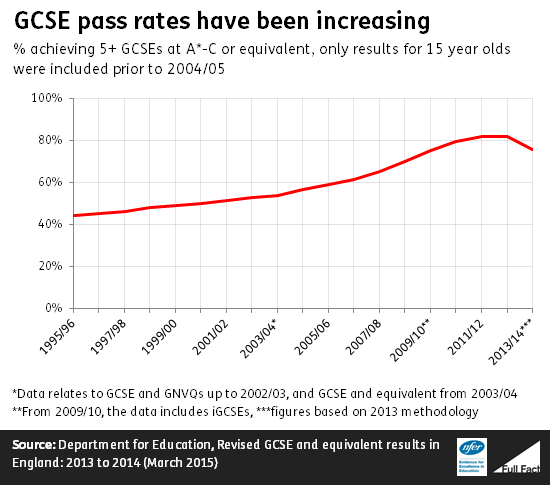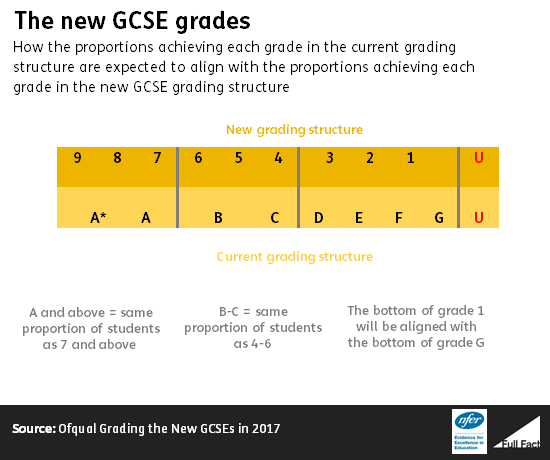GCSE and A Level reform: are the new qualifications returning a 'gold standard' of assessment?
- While the GCSE pass rate has increased since its introduction, this doesn't tell us very much about how standards have changed. Evidence from international surveys suggests that education standards have remained stable.
- Stopping the use of modules and limiting re-sits is likely to reduce pass rates but this is not the same as improving standards.
- The changes to GCSE grading are likely to make it easier to differentiate between the very best students in the exams.
- The focus on written examinations rather than practical exams such as for science is likely to improve reliability in results but we don't know how this will affect the teaching of these skills.
- The effects of all the reforms are difficult to predict in advance and it is likely that different groups will be affected differently.
GCSEs are being reformed with the intention that they'll be "more challenging so pupils are better prepared for further academic or vocational study, or for work", according to the government. There'll also be a new grading scale that uses the numbers 1 to 9 to identify levels of performance, with 9 being the top grade; a shift to assessment just at the end of the course and without a split between modules; and more use of exams rather than coursework.
AS and A levels are going through similar reforms with the main change being that AS and A levels will be decoupled—meaning that AS results will no longer count towards an A level, as they do now.
Former Education Secretary Michael Gove has said that the new reforms would "address the pernicious damage caused by grade inflation and dumbing down".
Since the introduction of the GCSE in 1986, the percentage getting a good GCSE (A* to C) has risen, only stabilising in the past few years (data prior to 1995/96 is available from Alan Smithers at the University of Buckingham and refers to single passes while the more recent data refers to 5 or more A*-C).
But this doesn't necessarily mean standards have fallen—and data from international surveys such as the Programme for International Student Assessment, Programme for International Assessment of Adult Competencies and Trends in International Mathematics and Science Study and Progress in International Reading Literacy Study suggest that standards have been remarkably stable in England.
Factors such as changes to the curriculum, how it is examined, variations in the policy on re-sits, as well as genuine changes to educational standards, may have all had an impact on pass rates.
Young people aren't as skilled as older adults, but this isn't new
It is true that young adults (aged 16-24) in England are not as skilled as their older compatriots when it comes to literacy, numeracy and problem solving, according to data from The International Survey of Adult Skills 2012. But this isn't anything new and it doesn't necessarily prove that children are leaving school with lower levels of skill than previous generations—it's just that young people continue to pick up on these skills into adulthood.
Even if skill levels among school leavers are comparatively low, this also doesn't necessarily mean education standards are falling. It could just mean that what is being taught isn't giving all young people the skills they need for everyday life or work, as a British Chambers of Commerce survey has suggested. For example, standards of education on Shakespeare could remain high while at the same time students' capabilities in writing a technical report, or some other workplace skill, could still be low.
GCSEs are not designed to be as hard as the O-level and ask different types of questions
It has been claimed that exam questions are getting easier, and that they're nothing like as hard as the previous O-levels.
But the O level was an academic qualification designed for approximately the top 20% of the cohort who would go on to study A Levels and aspire to university. The rest sat the CSE. The GCSE is designed to assess the whole cohort and so is designed to have more 'easy' questions in it than the O level.
Ofqual, the qualifications regulator, compared sets of question papers for GCSE biology and chemistry and A level biology between 2003 and 2008, and for A level geography between 2001 and 2010. The findings were mixed: for example it found biology questions from the later years were more likely to demand less of teenagers than the earlier years, as they had more multiple-choice questions and fewer essay questions but that the chemistry questions were more demanding.
Our understanding of how to accurately and fairly assess students has also improved significantly, based on research evidence over the past few decades.
For example, there was an O level creative writing question in the 1950s that was only available in the archives so we can't link to it, where the question was worded so badly the responses didn't cover the right subject. Students were asked to write an essay titled 'The Vanishing Horse' and the examiners were expecting an essay on how horse power had been replaced by mechanisation but most students wrote about horses vanishing in either a fantastic or enigmatic way. It proved very difficult to mark and so students performed poorly, giving unreliable results.
Putting aside the question of whether this question was testing students' creative writing skills or knowledge of social history and rural affairs, if this was set today as a GCSE question, it would be more likely phrased more along the lines of:
Write an editorial for Country Life Magazine about how horses have been replaced by tractors on farms. Decide if if this is a good or bad thing and write to convince your readers of your position. It should be titled 'The Vanishing Horse'.
This does not make what is being tested easier or harder but it does much more clearly tell the student what they have to do and allows the examiners to judge it more fairly.
MPs have also argued that exam boards are competing on making their syllabuses more 'accessible', creating a "race to the bottom". This conclusion was formed on the basis that schools under pressure to achieve the highest possible grades for their students have an incentive to choose syllabuses they perceive to be easier; and exam boards competing for income from schools have an incentive to meet this demand.
Ofqual says that since 2012 it has been using an approach of working with each exam board which ensures that significant unexplained year-on-year increases in higher grades awarded do not happen—an approach it credits as being responsible for the recent levelling off in the percentage of higher grades awarded to students.
Decreasing opportunities for resits won't necessarily make the exams more rigorous
The government has argued that the ability to enter exams early and potentially re-take at a later stage harms performance and focuses teaching too much on exam preparation. Analysis by the Department for Education showed that candidates who enter early perform worse compared to students who do not, even when resits are taken into account.
In 2013 the government announced that only a student's first entry to a GCSE examination will count in their school's performance tables. While the changes do not rule out pupils continuing to resit exams, the changes are intended to discourage this from happening.
This change may decrease pass rates but does not necessarily mean the assessment is more rigorous. Students will be expected to meet the same standards and the tests will be of the same difficulty, but are likely to be given fewer opportunities to demonstrate what they can achieve. We don't know what impact this might have on longer-term retention of information or analytical skills, potentially those who re-sat might have retained the material better—we simply don't know.
We don't yet know what impact the shift away from assessing science practical skills or speaking skills in English towards written exams will have on the teaching and acquisition of these skills. The changes should make the GCSE results easier to examine reliably, but they might do this to the detriment of those skills—which pupils still need to acquire—but which are harder to assess.
The new grades are expected to set higher expectations, with an additional grade above the current A*
When former Education Secretary Michael Gove announced the next steps to reform of GCSEs and A levels he said the reforms would "make these qualifications more ambitious" and would "set higher expectations".
The equivalent of the current GCSE C grade/standard is expected to be higher in the new GCSEs although, until it is graded in 2017, no-one knows exactly. For the rest, the numeric grades will map to the old letter grades but with an additional Grade 9 above the current A*.
No one really knows what impact the new grades will have on things like school league tables.
Ofqual has said that the new grade set will provide a better distinction between students of similar abilities. But some concerns have been expressed that the new grading system and focus on the higher achievers might lead lower achievers to become more disengaged, which could decrease average performance.
One of the explanations for Poland's improved standings in the international rankings is due to its focus on reducing underachievement so rather than raising standards the changes could reduce England's PISA ranking.
We don't yet know what impact the separation of AS levels will have
One of the major changes and one of the most controversial is the 'uncoupling' of AS from A level. As a result of the separation of the AS level grade from the A level grade, students studying for A level will now go straight into doing so after their GCSEs. Students can still study AS level courses, and these are intended to be taught alongside A level students where possible,but how easy this will be for teachers in practice remains to be seen.
There is also debate about how universities will use the new results when making offers and how this will affect students. As students make applications before they have their A level results, universities have traditionally used AS results as a more unbiased predictor than the schools' predicted grades.
Some have argued that not having information on pupil ability provided from AS-levels will make it harder to select students for university places, and will particularly affect 'late developers' who perform better at AS-level than might have been expected from their GCSE results.We don't really know if this will be the case in practice. What universities have agreed is that students will not be advantaged or disadvantaged if they choose to take AS levels or A levels.
This briefing was written by Newman Burdett of the National Foundation for Educational Research in collaboration with Full Fact. This work has been funded by the Nuffield Foundation but the content is the responsibility of the authors and of Full Fact, and not of the Nuffield Foundation.

